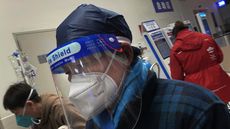Coronavirus vaccine will not allow rapid return to normal life, scientists warn
Royal Society warns it may take up to a year to distribute Covid-19 jabs

The development of a coronavirus vaccine in early 2021 will not mean an immediate return to normality, leading scientists have warned.
Even if a Covid-19 jab becomes available in spring, it will take upwards of a year to administer to everyone in the UK, the report by the Royal Society says.
The UK’s national academy of sciences cautioned that people need to be “realistic” about what a vaccine can achieve, adding that other virus-fighting measures - such as social distancing - will need to remain in place.
Subscribe to The Week
Escape your echo chamber. Get the facts behind the news, plus analysis from multiple perspectives.

Sign up for The Week's Free Newsletters
From our morning news briefing to a weekly Good News Newsletter, get the best of The Week delivered directly to your inbox.
From our morning news briefing to a weekly Good News Newsletter, get the best of The Week delivered directly to your inbox.
“Even if it is effective, it is unlikely that we will be able to get back completely to normal,” said Charles Bangham, chairman of immunology at Imperial College London and one of the authors of the report.
“There’s going to be a sliding scale: even after the introduction of a vaccine that we know to be effective, we will have to gradually relax some of the other interventions.”
Professor Nilay Shah, head of chemical engineering at Imperial College London, added that life will not be “returning to normal in March” if a vaccine becomes available.
“If vaccination does start in the spring, it will take a long time to work through the different priority groups initially, and then the wider population later on,” Shah said. “We may be able to start the process but then to get through that vaccination process, it will take many months, maybe more than a year.”
There are currently more than 200 potential vaccines being developed by scientists, with “optimism, including from the UK government's scientific advisers, that some people may get a vaccine this year and mass vaccination may start early next year”, the BBC says.
The report from the Royal Society comes just weeks after a senior World Health Organization (WHO) official issued a similar warning, saying hopes that a coronavirus vaccine will end the global pandemic are unrealistic.
Hans Kluge, the health agency’s regional director for Europe, told Bloomberg that while there has been an “unprecedented coordinated effort globally” to create a working vaccination, the drug is “not the issue”.
“The vaccine is not going to be the end of the pandemic,” Kluge said. “The end of the pandemic is going to be when we as people learn to live with the pandemic, and that can begin tomorrow.”
Create an account with the same email registered to your subscription to unlock access.
Sign up for Today's Best Articles in your inbox
A free daily email with the biggest news stories of the day – and the best features from TheWeek.com
-
 'Good riddance to the televised presidential debate'
'Good riddance to the televised presidential debate'Instant Opinion Opinion, comment and editorials of the day
By Harold Maass, The Week US Published
-
 Caitlin Clark the No. 1 pick in bullish WNBA Draft
Caitlin Clark the No. 1 pick in bullish WNBA DraftSpeed Read As expected, she went to the Indiana Fever
By Peter Weber, The Week US Published
-
 Today's political cartoons - April 16, 2024
Today's political cartoons - April 16, 2024Cartoons Tuesday's cartoons - sleepyhead, little people, and more
By The Week US Published
-
 Covid four years on: have we got over the pandemic?
Covid four years on: have we got over the pandemic?Today's Big Question Brits suffering from both lockdown nostalgia and collective trauma that refuses to go away
By Chas Newkey-Burden, The Week UK Published
-
 The hollow classroom
The hollow classroomOpinion Remote school let kids down. It will take much more than extra tutoring for kids to recover.
By Mark Gimein Published
-
 Excess screen time is making children only see what is in front of them
Excess screen time is making children only see what is in front of themUnder the radar The future is looking blurry. And very nearsighted.
By Devika Rao, The Week US Published
-
 Car fatality rates are driving up
Car fatality rates are driving upThe Explainer The dang Covid pandemic made us worse drivers
By Devika Rao, The Week US Published
-
 Covid-19: what to know about UK's new Juno and Pirola variants
Covid-19: what to know about UK's new Juno and Pirola variantsin depth Rapidly spreading new JN.1 strain is 'yet another reminder that the pandemic is far from over'
By Arion McNicoll, The Week UK Published
-
 Long-term respiratory illness is here to stay
Long-term respiratory illness is here to stayThe Explainer Covid is not the only disease with a long version
By Devika Rao, The Week US Published
-
 Covid inquiry: the most important questions for Boris Johnson
Covid inquiry: the most important questions for Boris JohnsonTalking Point Former PM has faced weeks of heavy criticism from former colleagues at the public hearing
By The Week Staff Published
-
 China's pneumonia cases: should we be worried?
China's pneumonia cases: should we be worried?The Explainer Experts warn against pushing 'pandemic panic button' following outbreak of respiratory illness
By Keumars Afifi-Sabet, The Week UK Published